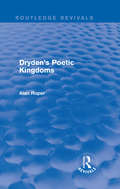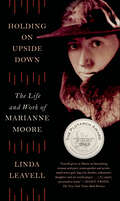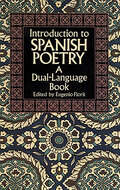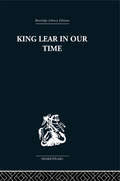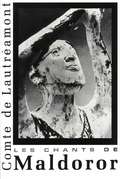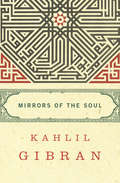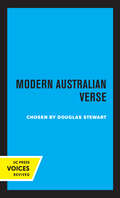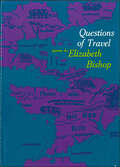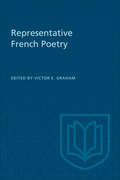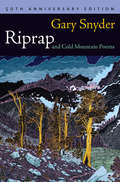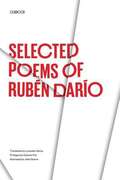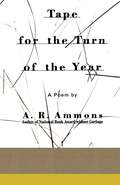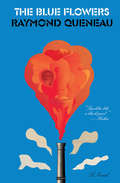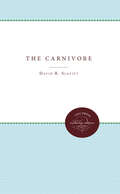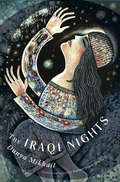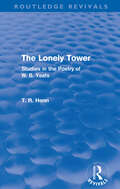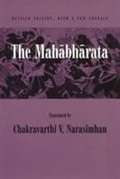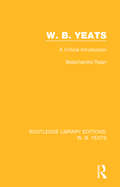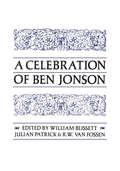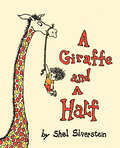- Table View
- List View
Dryden's Poetic Kingdoms (Routledge Revivals)
by Alan RoperDr. Roper describes the mode of many of Dryden’s original poems by redefining the royalism that provides the matter of some works and the metaphoric vocabulary of others. Dryden’s royalism is seen both as an identifiable political attitude and a way of apprehending public life that again and again relates superficially non-political matters to the standards and assumptions of politics in order to determine their public significance. Dryden’s Poetic Kingdoms, first published in 1965, principally through readings of ten poems, comes to the conclusion that Dryden’s poems are most successful when they work to create a meaningful analogy between such topics as literature and politics or between the constitution of England and the constitution of Rome, the Garden of Eden, or Israel under David.
Holding On Upside Down: The Life and Work of Marianne Moore
by Linda LeavellThis “perceptive and elegant biography” of modernist poet Marianne Moore “captures well the strange and entrancing drama” of her life (The Wall Street Journal).Winner of the Plutarch Award for the Best Biography of 2013In the popular imagination, Marianne Moore is dignified, white-haired, and demure in her tricorne hat. She lives with her mother until the latter’s death. She maintains meaningful friendships with fellow poets but never marries or falls in love.Linda Leavell’s Holding On Upside Down—the first biography of Moore written with the support of her family’s estate—delves beneath the surface of this calcified image to reveal a passionate, canny woman caught between genuine devotion to her mother and an irrepressible desire for freedom. Her many poems about survival are revealed to be not just quirky nature studies but acts of survival themselves.As a young poet, Moore joined the Greenwich Village artists and writers who wanted to overthrow all her mother’s pieties. She also won their admiration for the radical originality and technical proficiency of her verse. After her mother’s death thirty years later, the aging recluse transformed herself into a charismatic performer and beloved celebrity. She won virtually every literary prize available to her and was widely hailed as America’s greatest living poet.Elegantly written, meticulously researched, critically acute, and psychologically nuanced, Holding On Upside Down provides at last the biography that this major poet and complex personality deserves.
Introduction to Spanish Poetry: A Dual-Language Book (Dover Dual Language Spanish)
by Eugenio FloritFrom the 12th-century Cantar de Mío Cid to the 20th-century poetry of García Lorca, Salinas, and Alberti, this book contains 37 poems by Spain's greatest poets. Selected by Professor Eugenio Florit, the poems are presented in the full original Spanish text, with expert literal English translations on the facing pages. Enjoy the poetic inspiration, imagery, insight, and wisdom of such masters as Lope de Vega, Miguel de Unamuno, Federico García Lorca, Margués de Santillana, Jorge Manrique, Garcilaso de la Vega, Fray Luis de León, San Juan de la Cruz, Francisco de Quevedo y Villegas, Gustavo Adolfo Bécquer, Antonio Machado, Rafael Alberti, Pedro Salinas, and many more. In addition to the poetic texts, Professor Florit has also provided a wealth of biographical and critical commentary, outlining the significance of the poets and their works in the long tradition of Spanish literature. Portraits of the poets are included where available.
King Lear in our Time
by Maynard MackThis edition first published in 1966. Previous edition published 1965 by the University of California Press. Perhaps more than any other play of Shakespeare's King Lear has been subjected to almost totally contradictory interpretations. In the first historical section of the book the author describes the varying concepts of the play and the distortions of text and even plot that have been widely used. Garrick's playing of Lear as a pathetic and down-trodden old man. Laughton's and Olivier's versions and Herbert Blaus's theory of the 'subtext' are described and analysed. The central section of the book examines the medieval, folk and romance sources of the play. The final chapter illustrates how the action of the play and its pervading violence and evil are not explained in terms of human motive and rely for their meaning more on their effects than their antecedents. An important theme is the play's examination of society and the ties of service and family love.
Maldoror (Les Chants de Maldoror)
by Guy Wernham Conte De LautreamontThis macabre but beautiful work, Les Chants de Maldoror, has achieved a considerable reputation as one of the earliest and most extraordinary examples of Surrealist writing. Maldoror is a long narrative prose poem which celebrates the principle of Evil in an elaborate style and with a passion akin to religions fanaticism. The French poet-critic Georges Hugnet has written of Lautréamont: "He terrifies, stupefies, strikes dumb. He could look squarely at that which others had merely given a passing glance." When first published in 1868-69, Maldoror went almost unnoticed. But in the 1890s the book was rediscovered and hailed as a work of genius by such eminent writers as Huysmans, Léon Block, Maeterlinck, and Rémy de Gourmont. Later still, Lautréamont was to be canonized as one of their principal "ancestors" by the Paris surrealists. This edition, translated by Guy Wernham, includes also a long introduction to a never-written, or now lost, volume of poetry. Thus, except for a few letters, it gives all the surviving literary work of Lautréamont.
Mirrors of the Soul
by Kahlil GibranA well-rounded look at the personal life, poetry, painting, and philosophy of the famous twentieth-century spiritual guide and author of The Prophet. Kahlil Gibran wrote prolifically and passionately in Arabic as well as English. First published in 1965 with nine works of poetry translated by Joseph Sheban, Mirrors of the Soul includes writings by Gibran that are as poignant today as when first written, such as &“The New Frontier&” and&“The Sea.&” These poems illuminate the dual nature of Gibran, who lived in the shadows both of New York skyscrapers and the cedars of his childhood Lebanon. Sheban enriches the new works with an insightful biography, a historical examination of politics and religion in Gibran&’s native land, and the inclusion of revolutionary poems such as &“My Countrymen&” and &“My People Died.&”
Modern Australian Verse: Modern Australian Verse (Poetry in Australia)
by Douglas StewartThis title is part of UC Press's Voices Revived program, which commemorates University of California Press’s mission to seek out and cultivate the brightest minds and give them voice, reach, and impact. Drawing on a backlist dating to 1893, Voices Revived makes high-quality, peer-reviewed scholarship accessible once again using print-on-demand technology. This title was originally published in 1965.
Penguin Book of Zen Poetry
by Lucien StrykThe Penguin Book of Zen Poetry has Chinese poems of enlightenment and death, poems of the Japanese Zen masters, and Japanese Haiku.
Poets Of Reality: Six Twentieth-Century Writers
by J. Hillis MillerPassages from six twentieth century authors: Joseph Conrad, W.B. Yeats, T. S. Eliot, Dylan Thomas, Wallace Stevens, William Carlos Williams
Questions of Travel: Poems
by Elizabeth BishopThe publication of this book is a literary event. It is Miss Bishop's first volume of verse since Poems, which was awarded the Pulitzer Prize for Poetry in 1955. This new collection consists of two parts. Under the general heading "Brazil" are grouped eleven poems including "Manuelzinho," "The Armadillo," "Twelfth Morning, or What You Will," "The Riverman," "Brazil, January 1, 1502" and the title poem. The second section, entitled "Elsewhere," includes others "First Death in Nova Scotia," "Manners," "Sandpiper," "From Trollope's Journal," and "Visits to St. Elizabeths." In addition to the poems there is an extraordinary story of a Nova Scotia childhood, "In the Village."Robert Lowell has recently written, "I am sure no living poet is as curious and observant as Miss Bishop. What cuts so deep is that each poem is inspired by her own tone, a tone of large, grave tenderness and sorrowing amusement. She is too sure of herself for empty mastery and breezy plagiarism, too interested for confession and musical monotony, too powerful for mismanaged fire, and too civilized for idiosyncratic incoherence. She has a humorous, commanding genius for picking up the unnoticed, now making something sprightly and right, and now a great monument. Once her poems, each shining, were too few. Now they are many. When we read her, we enter the classical serenity of a new country."
Representative French Poetry (Second Edition)
by Victor E GrahamThe making of a reasonably comprehensive anthology which is intended to do more than reflect the personal literary tastes of the anthologists is not an easy task, but is certainly an exciting and challenging one. It is important, of course, if it is to have coherence and validity, that its audience be reasonably well defined and kept in mind as the selection proceeds. The anthology offered by Professor Graham has been prepared carefully to meet the needs of students reading French poetry while in the early years of their university course. It does not attempt to be a bulky sample of the whole field of French poetry but rather to be a judicious selection of the works of poets who may be described as typical of the best in their age. From each of them have been included some well-known selections which students must always meet and also some less well known which are nevertheless equal in quality and whose relative unfamiliarity may give them a special appeal to instructors. A particularly interesting and valuable feature of the anthology is that the editor has in a good many cases chosen poems on similar themes from different authors, and students will thus be able to compare styles of different centuries and different poets as applied to certain specific subjects. (For example, the selection includes Deschamps' "Balade" on "Renart et le Corbaut" and La Fontaine's "Le Corbeau et le Renard'; Lamartine's and also Leconte de Lisle's "Le Lac.")
Riprap and Cold Mountain Poems
by Gary SnyderBy any measure, Gary Snyder is one of the greatest poets in America in the last century. From his first book of poems to his latest collection of essays, his work and his example, standing between Tu Fu and Thoreau, has been influential all over the world. Riprap, his first book of poems, was published in Japan in 1959 by Origin Press, and it is the 50th anniversary of that groundbreaking book that is celebrated with this new edition. A small press reprint of that book included Snyder's translations of Han Shan's Cold Mountain Poems, perhaps the finest translations of that remarkable poet ever made into English. For the 50th anniversary, this completely redesigned edition of Riprap is accompanied by a CD of Snyder reading all the poems in this collection, with introductions and asides. The recording, made in the poet's home by Jack Loeffler, marks the first time a complete reading has ever been available in a commercial edition. One of the finest collections of poems published in the 20th century, this edition will please those already familiar with this work and excite a new generation of readers with its profound simplicity and spare elegance.
Selected Poems
by Robinson JeffersThe poems in this volume have been selected from Robinson Jeffers' major works, among them Be Angry at the Sun, Hungerfield, The Double Axe, The Beginning and the End, and Roan Stallion, and Tamar and Other Poems.
Selected Poems of Ruben Dario
by Ruben DarioRubén Darío changed the whole course of Spanish poetry, by converting it to "modernism" and by halting what he called "the mummification of Spanish rhythms. " Exotic, erratic, revolutionary, he was a major poet by any standards. This translation, by a man who is himself a poet, brings to English readers the whole range of Darío's verse-from the stinging little poems of Thistles to the dark, tired lines written at the end of his life.
Star Over Bethlehem and Other Stories
by Agatha Christie MallowanThis collection contains six short stories and five poems of a religious nature: A Greeting, Star Over Bethlehem, A Wreath for Christmas, The Naughty Donkey, Gold, Frankincense and Myrrh, The Water Bus, In the Cool of the Evening, Jenny by the Sky, Promotion in the Highest, The Saints of God and The Island.
Tape for the Turn of the Year
by A. R. Ammons“This is the most surprising formal invention of a major innovator, is the fullest vision Ammons gives us of his enormous creative enterprise. Among the major descendents of Whitman’s Song of Myself, Tape occupies an essential imaginative space, showing us much about what is essential in the American poetic imagination.” —Harold Bloom In the form of a journal covering the period December 6, 1963, through January 10, 1964, A. R. Ammons’s long, thin poem was written on a roll of adding-machine tape, then transferred foot by foot to manuscript. He chose this method as a serious experiment in making a poem adapt to something outside itself. The tape determined both the length of the poem’s lines and when it ends. Tape for the Turn of the Year is a poem of infinite variety, blessed by the rich resources of one of this century’s greatest poets. By turns witty, serious, lyrical, and meditative, it is at once a superbly entertaining book and a significant literary achievement.
The Blue Flowers
by Barbara Wright Raymond QueneauOnly a pataphysician nurtured lovingly on surrealist excess could have come up with The Blue Flowers, Queneau's 1964 novel. At his death in 1976, Raymond Queneau was one of France's most eminent men of letters--novelist, poet, essayist, editor, scientist, mathematician, and, more to the point, pataphysician. And only a pataphysician nurtured lovingly on surrealist excess could have come up with The Blue Flowers, Queneau's 1964 novel, now reissued as a New Directions Paperbook. To a pataphysician all things are equal, there is no improvement or progress in the human condition, and a "message" is an invention of the benighted reader, certainly not the author or his perplexing creations--the sweet, fennel-drinking Cidrolin and the rampaging Duke d'Auge. History is mostly what the duke rampages through--700 years of it at 175-year clips. He refuses to crusade, clobbers his king with the "in" toy of 1439--the cannon--dabbles in alchemy, and decides that those musty caves down at Altamira need a bit of sprucing up. Meanwhile, Cidrolin in the 1960s lolls on his barge moored along the Seine, sips essence of fennel, and ineffectually tries to catch the graffitist who nightly defiles his fence. But mostly he naps. Is it just a coincidence that the duke appears only when Cidrolin is dozing? And vice versa? In the tradition of Villon and Céline, Queneau attempted to bring the language of the French streets into common literary usage, and his mad word-plays, bad puns, bawdy jokes, and anachronistic wackiness have been kept amazingly and glitteringly intact by the incomparable translator Barbara Wright.
The Carnivore (Contemporary Poetry Series)
by David R. SlavittDirectly or obliquely, while reading Gibbon or shopping for toys at F. A. O. Schwarz, Slavitt addresses, invokes, or simply enjoys the civilization that has been the poet's true subject from the time of the wandering bards. Upon the foundation of technical mastery, he has begun to build an oeuvre, to assert himself, and, with insouciance and gaiety, to grow into his majority.Originally published in 1965.A UNC Press Enduring Edition -- UNC Press Enduring Editions use the latest in digital technology to make available again books from our distinguished backlist that were previously out of print. These editions are published unaltered from the original, and are presented in affordable paperback formats, bringing readers both historical and cultural value.
The Iraqi Nights
by Kareem James Abu-Zeid Dunya MikhailA stunning new collection by one of Iraq's brightest poetic voices The Iraqi Nights is the third collection by the acclaimed Iraqi poet Dunya Mikhail. Taking The One Thousand and One Nights as her central theme, Mikhail personifies the role of Scheherazade the storyteller, saving herself through her tales. The nights are endless, seemingly as dark as war in this haunting collection, seemingly as endless as war. Yet the poet cannot stop dreaming of a future beyond the violence of a place where "every moment / something ordinary / will happen under the sun." Unlike Scheherazade, however, Mikhail is writing, not to escape death, but to summon the strength to endure. Inhabiting the emotive spaces between Iraq and the U.S., Mikhail infuses those harsh realms with a deep poetic intimacy. The author's vivid illustrations -- inspired by Sumerian tablets -- are threaded throughout this powerful book.
The Lonely Tower: Studies in the Poetry of W. B. Yeats (Routledge Revivals)
by Thomas Rice HennFirst published in 1965, this reissue of the second edition of T. R. Henn’s seminal study offers an impressive breadth and depth of meditations on the poetry of W. B. Yeats. His life and influences are discussed at length, from the impact of the Irish Rebellion upon his youth, to his training as a painter, to the influence of folklore, occultism and Indian philosophy on his work. Henn seeks out the many elements of Yeats’ famously complex personality, as well as analysing the dominant symbols of his work, and their ramifications.
The Mahabharata: An English Version Based on Selected Verses
by Chakravarthi V. NarasimhanIntended to be a treatise on life itself, this epic poem embraces religion and ethics, polity and government, philosophy and the pursuit of salvation. This collection of more than 4,000 verses is supplemented by a glossary, genealogical tables, and an index correlating the verses with the original Sanskrit text.
The Works of John Dryden: Wild Gallant, Rival Ladies, The Indian Queen, Volume VIII
by John Dryden John Harrington Smith Dougald MacmillanVolume VIII contains three of Dryden's Plays, along with accompanying scholarly apparatus: Wild Gallant, Rival Ladies, and Indian Queen.
W. B. Yeats: A Critical Introduction (Routledge Library Editions: W. B. Yeats #6)
by Balachandra RajanThis chief aim of this title, first published in 1965, is to present a comprehensive picture of Yeats’s achievement and some of the means for an evaluation of that achievement. To this end both the poems and plays have been examined and some of Yeats’s critical ideas have been briefly discussed. Professor Rajan’s study provides a compact introduction to Yeats’s work, and will be of interest to the general reader as well as to students of literature.
A Celebration of Ben Jonson
by William F. Blissett Julian Patrick R.W. Van FossenThe papers in this volume were given by some of the world's foremost Jonsonian scholars at a conference at the University of Toronto which marked the 400th anniversary of his birth. Each contributor came from a different institution, and Canada, the United States, Great Britain, and New Zealand were represented. The balance of papers likewise reflects the range of Ben Jonson's achievement and the combination of brio and control so characteristic of him.The papers arrange themselves in pairs: 'The Incredibility of Jonsonian Comedy,' as discussed by Professor Clifford Leech, is of a piece with distrust and defiance of the audience as discussed in the paper 'Jonson and the Loathèd Stage' by Professor Jonas Barish; Professor George Hibbard in 'Ben Jonson and Human Nature' and Professor D.I. McKenzie in 'The Staple of News and the Late Plays' offer critical assessment of plays, the one wide-ranging, the other closely focused on a previously neglected play; and Professor H.N. Maclean in '"A More Secret Cause": The Wit of Jonson's Poetry' and Professor L.C. Knights in 'Ben Jonson: Public Attitudes and Social Poetry' approach the difficult and rewarding task of defining Jonson's poetry of appraisal in different but complementary styles.
A Giraffe and a Half
by Shel SilversteinFrom Shel Silverstein, the New York Times bestselling author of Where the Sidewalk Ends and The Giving Tree, comes a riotous rhyming picture book about a boy and his giraffe! Featuring rhythmic verse and iconic illustrations, A Giraffe and a Half will surely leave every reader, young and old, laughing until the very end. Beloved for over fifty years, this classic captures Silverstein’s signature humor and style.If you had a giraffe and he stretched another half, you would have a giraffe and a half. But what happens if you glue a rose to the tip of his nose? Or if you used a chair to comb his hair? Join this giraffe on a rollicking and ridiculous journey that will charm readers from beginning to end. And don't miss Runny Babbit Returns, the new book from Shel Silverstein!
